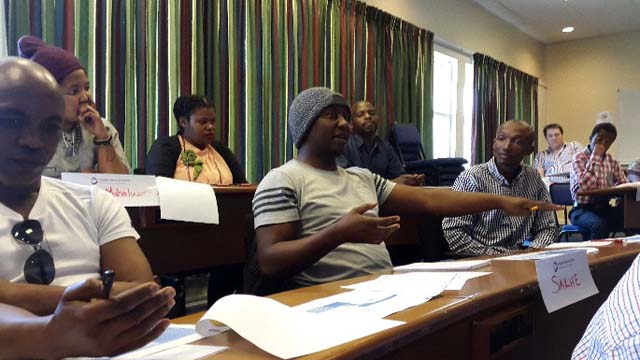
On Saturday, 27th August 2016 Rhodes Business School launched the very successful and well received Biz Community Workshop, the first of a series of community workshops.
Partnering with the Assumption Development Centre (ADC) and the Department of Social Development Business Network, the workshop targets emerging businesses within the Grahamstown community and surrounding areas. The programme aims to provide formal training around the mobilization of existing resources to meet the needs of emerging business.
The first workshop was a resounding success and was fully subscribed. Business expressed the need for structured conversations on an ongoing basis.
The idea behind this project is to explore and map the needs of emerging business through a people centric approach, and in partnership with these local emerging businesses, the ADC and DSDBN, to develop and implement an ongoing programme of engagement. The strongest focus is giving a voice to the emerging start-up businesses and letting them dictate the needs specific to them, within the Grahamstown Community and its surrounding areas. “We need to understand the needs first and foremost, and then plan a twelve month cycle of further engagements and workshops” says the project lead, Senior Lecturer Mr Evert Knoesen, “this is also an opportunity for Grahamstown’s emerging businesses to test entrepreneurial ideas through the business canvas model, thereby reducing the risk of start-up failure”.
Research shows that 2 out of every 10 start-ups fail within their first three years of existence. In a developing economy where people are resource constrained there is a devastating consequence when start-ups fail. The Biz Community Workshop aims to reduce the risk of business start-up failure and ultimately assist in breaking the cycle of poverty within the Grahamstown community and its surrounding areas. The business canvas model has been successful in testing and evaluating entrepreneurial ideas by focusing on value proposition, identifying the target market, and ultimately getting the product to market, all while practicing triple bottom line sustainable business best-practice.
Knoesen adds, “once these needs are identified, we will then plot the way forward, through our partnerships, for a sustained engagement offering continued support to this group of business.” He believes the success of this program will be measured in the continued community participation, engagement and attendance of these workshops.
The final focus of this programme is the mobilization of alumni and student participation, echoing the words of Rhodes University Vice-Chancellor, Dr Sizwe Mabizela, “Rhodes University strives to be a vibrant and innovative knowledge institution that forms professionals, thinkers and actors, who continually contribute to economic and social development and an equitable, just and democratic society.”
